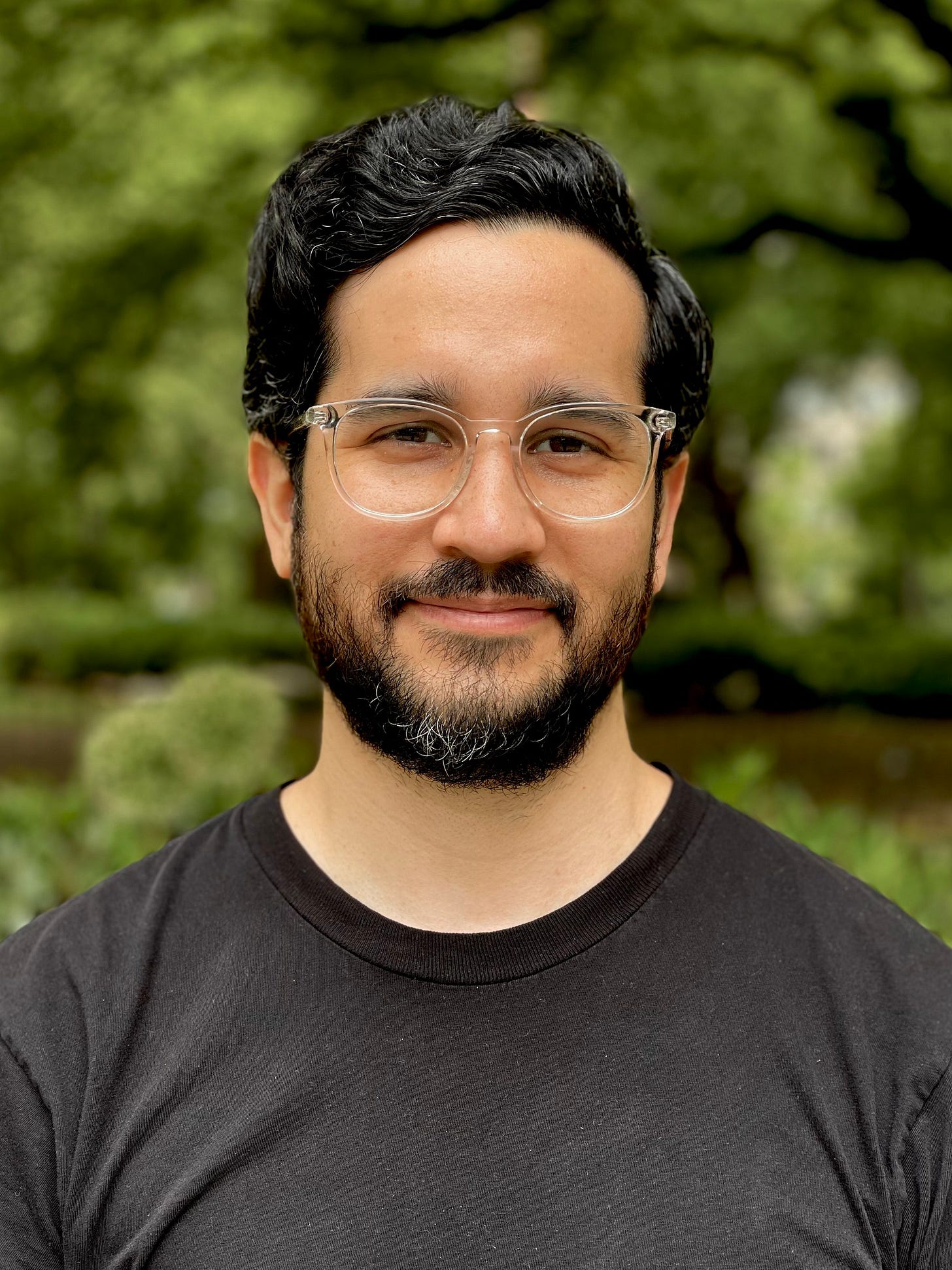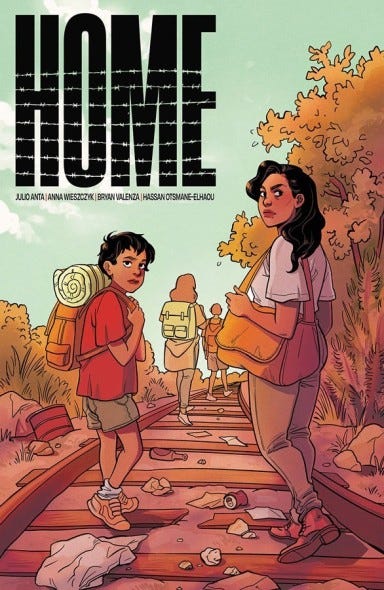“What called me to write was, unfortunately, the child separation crisis that was happening at the border.”
Julio Anta on the anger that fueled writing comics and graphic novels.
Over multiple graphic novels and comics, writer Julio Anta consistently centers diverse Latinx characters in his stories. From his debut comic, Home, inspired by the fury of watching child separation at the U.S. border to his most recent middle-grade graphic novel, Speak Up, Santiago! Julio’s work offers crucial opportunities for readers to see themselves reflected in books and comics today.
In the first part of our conversation, Julio shares his pathway into writing his debut Home, and the kind of anger that fuels his work today.
ALIX DICK: Can you describe the journey that called you to become a graphic novelist?
JULIO ANTA: I think that's a good way to frame it--when I felt “called” to do it--because we all grow up as writers. We go to school, we write essays, we write in our journals, we tell stories to each other. We do all sorts of writing. And I did a little more than that when I was in college. I would write for magazines and websites about music, do album reviews and concert reviews, things like that. But then I pretty much stopped writing until 2018 or 2019. And what called me to write was, unfortunately, the child separation crisis that was happening at the border. I grew up reading comic books. I loved reading comic books and manga and watching anime. I had this love of that world and that medium. And just, like a lot of people, I was extremely angry as child separation was happening.
I was seeing kids that reminded me of my father who came to the US from Cuba when he was five years old. At the time, my son was three years old, so I was seeing him in the eyes of these children too. I don't know if the right word is obsessing, but just I was really into the coverage of what was happening. I was listening to interviews with mothers who had no idea where their children were. I was just watching all the coverage, reading everything I could, just obsessing about it to maybe an unhealthy level.
Like a lot of readers of comics, at a certain point, I started thinking, “I can write these things. It can't be that difficult.” It turns out it is pretty difficult and I had a lot to learn, but it was all to tell the story of Home, my first book. I had the idea of home. I thought this can be a comic book series and it could be a way to take the American mythology, which to me is superhero mythology. Marvel movies are at their height at this point. And I thought, “What if we take this mythology that so many people are so invested in, but with a character that in real life has very little agency over what happens to them?”
I had to teach myself how to write comics and go from there. It was all in service of writing Home that I felt called to first become a writer.
“I was seeing kids that reminded me of my father who came to the US from Cuba when he was five years old. At the time, my son was three years old, so I was seeing him in the eyes of these children too.”
ANTERO GARCIA: You’ve worked with several different artists across your projects at this point. I'm curious if you could speak to the writing process?
JA: It totally depends. I write in two different markets. I write in the comics market, which is known as the direct market. That is single issues. That's where Marvel and DC and all that stuff lives. And then I also write in the book market, which is young adult, middle grade books that are published by traditional publishers, people like Harper Collins, Penguin, Random House. The process is different for each of them. Generally, I like to work with artists that I know and that are my friends. That's why you see me working a lot with someone like Jacoby Salcedo, who I did Frontera and This Land is Our Land. I work a lot with Yasmín Flores Montañez, who I did Si Se Puede with, and we're working on another book together now. Gabi Mendez, who's the artist on Speak Up, Santiago!, is already drawing our next book.
Personally, I like to be extremely collaborative in comics because that's just the nature of them. I like to work with people that I really align with, not just artistically, but I think also--because of the nature of the work that I do--politically as well. When Jacoby and I first met, we had very similar political perspectives, but he was maybe a little earlier in that journey of being so politicized. I think working on the sorts of books that we worked on together and that we continue to work on together has continued to push him down that road. On the other hand, someone like Yasmín, she's from Puerto Rico. She's super passionate about Puerto Rican issues, and I've learned a lot from her. And a book that we're currently working on right now is actually about Puerto Rican revolutionaries. To me, it's this very collaborative relationship, not just of working together, but also of learning from each other as well.
AD: Do you see any central themes or goals across the books that you are writing?
JA: Most of my work does focus on a particular issue that I'm passionate about. It starts with my own curiosity: maybe I want to learn more about Puerto Rican revolutionaries, for example. Now I'm doing all this research. But I think with every book I am, to a certain extent, trying to present my best argument for something. I want readers to come away educated and entertained, and hopefully it is a marriage that's really tight where you don't feel like you're being educated, you don't feel like it's all exposition and everything's being explained to you. If I'm doing a good job, I hope that it's so ingrained in these characters and their experiences that you are entertained and by the end you walk away having unconsciously learned all these things that I set out to tell in the book.
Especially for the younger age books, I want Latino readers to see themselves in these characters. And I want non-Latino readers to understand us. I think one of the flaws in human beings just generally is that we often have to come into contact with identities that are not our own to actually be able to identify and empathize and understand them. And I think media is a really good way of doing that when you don't have someone in front of you. If you don't have an undocumented person around you, maybe one of these graphic novels will help you understand that experience.
AD: What kind of feedback have you received from readers?
JA: When the first issue of Home came out, I was sort of inundated with messages on social media from people telling me like, “Wow, this is the first time I've seen my story or my family's story in a comic book.” That was a bit overwhelming for me at first, and at first made me feel very accomplished and proud of it. But then sort of realigned me in the anger that the book came from: how could it be 2021, and this is the first time that people who read comics every week, are seeing themselves in a comic book?
That brought me back to the anger, but also encouraged me to keep writing these stories because there are so few Latino comic creators, writers, and artists. Especially when you're telling these stories that are focused on that identity, it is so hard for those stories to break through at a lot of these publishers. I felt very lucky that Image Comics published Home, and I feel like that also set me up to be in a place where I could continue to tell these sorts of stories.
I think when you're talking about these subjects that have been so politicized, despite the fact that they shouldn't be political subjects, there is also backlash oftentimes. I've gotten that from people too: “Why do you focus on ‘illegals?’” or “Can you write anything else that isn't Latino characters?”
But to be honest, the vast majority of the feedback I've gotten has been positive. It's been from a lot of teachers and educators, and there's been, I know of at least three dissertations that have been written that feature my books in them. It's nice, as a community college dropout, to read graduate dissertations about my books that are oftentimes pointing out things that I didn't necessarily intend when I wrote them.
Propina
We’ll continue our conversation with Julio Anta next week, where we dive into his most recent book, Speak Up, Santiago!
We still have free Know Your Rights Stickers. Let us know where we can send you some.
We’ll see you next week.









